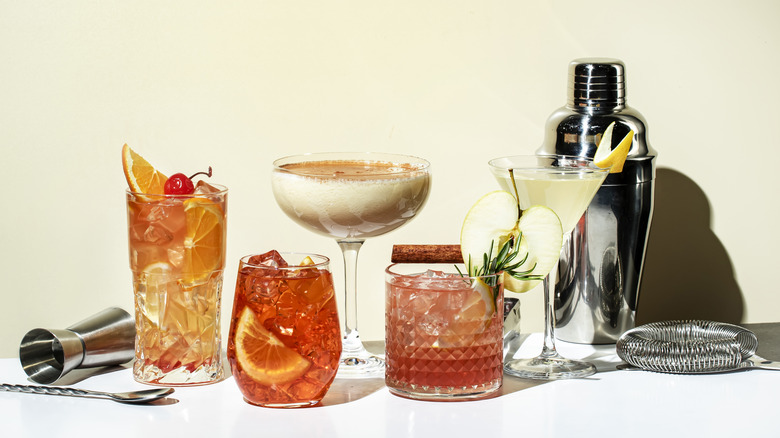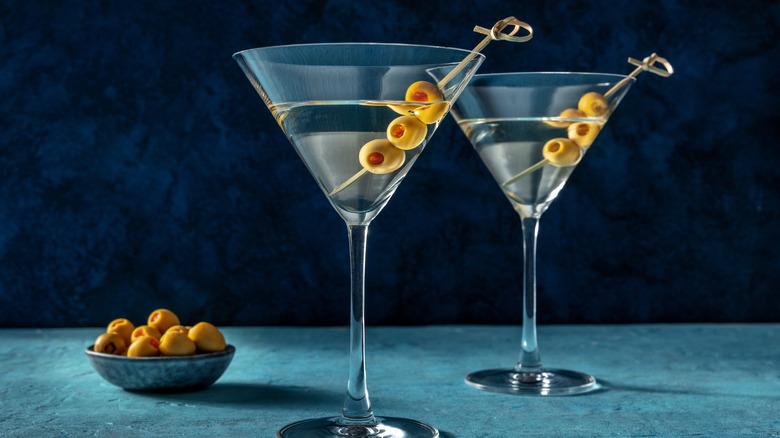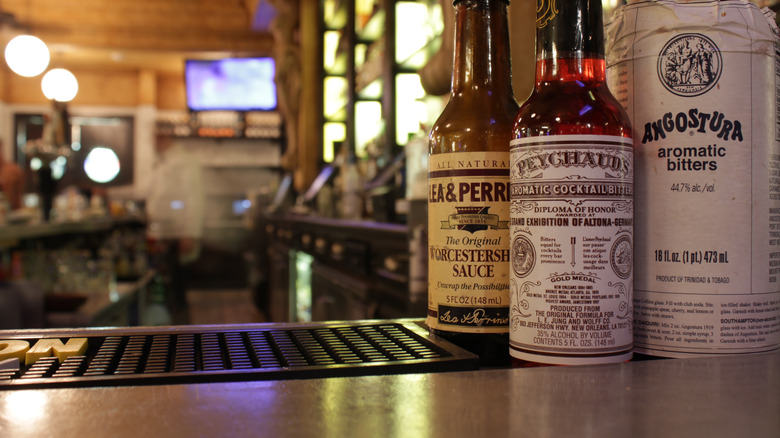Here's Where The Name 'Cocktail' Came From
What do the margarita, martini, and mojito have in common? They're all cocktails, of course. This means they are liquor-based drinks that feature at least three ingredients, as mixed drinks typically have just two. It's hard to imagine nightlife without these creative sippers, although the name is a bit unusual and apparently has something to do with the backside of a rooster.
According to the derivation originally provided by the Oxford English Dictionary, the drink's name evolved from a term used for racehorses of questionable parentage. "Cocktail," it seems, was once a term used synonymously for a horse with a docked tail. Docking, for the uninitiated, is a veterinary procedure that was done in the days of carriages to ensure the horse's tail wouldn't get in the way when the conveyances were being pulled. Nowadays, it's illegal in most countries. This procedure caused the tail to point upwards — like a cock's tail — instead of down like the tails we're accustomed to seeing on thoroughbreds. That's why the term "cocktail" suggested a lack of good breeding.
What this had to do with liquor-based drinks is rather opaque, but somehow in the early 19th century, mixed parentage in horses became equated with mixed drinks. As it happens, there are several other interesting origin stories for why cocktails acquired their current definition. But this is the one that is considered most likely to be true.
When the term cocktail began to refer to alcoholic drinks
The early 19th century is when the term "cocktail" is thought to have shifted from a synonym for a docked tail horse to the accepted definition for a certain kind of mixed drink. We know this because of its usage in the newspapers of the time. On May 13, 1806, the editor of a newspaper in Hudson, New York, called "The Balance, and Columbian Repository," famously referred to a cocktail as "a stimulating liquor composed of spirits of any kind." (Via Whistling Andy.)
It was a terrible name for a newspaper, and not surprisingly, it only lasted for another year before disappearing forever. But this definition, although used in specific reference to an early cocktail category called the bitter sling, did establish "cocktail" forevermore in a drink — rather than in an agricultural or horseracing — context. Thus, this date is now considered the birthday of the cocktail, and May 13 has subsequently become celebrated as World Cocktail Day.
Harry Croswell, the editor of the newspaper who furnished this definition in response to a question posed by a reader, gets credit in historical chronicles, although it's important to note that he neither invented the word nor the mixology that it describes.
Alternative origin stories for the modern cocktail
We do know that the term "cocktail" first appeared in its current usage in 1806, and we know that the word "cocktail" already existed in the English language before it acquired this newer meaning. What's less certain is whether the word for making drinks evolved from the earlier English usage.
One theory, for example, posits that the historical cocktail, as a form of drink, came from the French word "coquetier," which means egg cup. New Orleans bitters pioneer Antoine-Amadée Peychaud supposedly served brandy and bitters cocktails in egg cups before the cocktail drink had been defined in English. So, it's possible the cocktail Croswell defined was simply a mispronunciation of "coquetier," rather than a reference to horses of mixed parentage.
This is certainly plausible, more so than the alternative theory that the word "cocktail" came from the Aztec princess Xochitl, or that an American Revolution-era innkeeper served French soldiers a stolen chicken and garnished their drinks with (you guessed it) feathers from the cock's tail. There are, in fact, many other possibilities that have been proposed, but the likeliest explanation is simply that the word "cocktail," which already existed in English, was repurposed for creative drink recipes.



